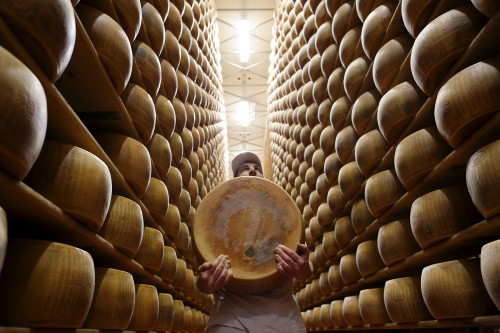By Jonathan Cable
LONDON (Reuters) -The decline in euro zone business activity eased this month as the bloc’s dominant services industry bounced back to growth and offset a long-running contraction in the manufacturing industry, a survey showed on Monday.
HCOB’s preliminary composite euro zone Purchasing Managers’ Index, compiled by S&P Global, rose to 49.5 in December from November’s 48.3 but was still shy of the 50 mark separating growth from contraction.
A Reuters poll had predicted a fall to 48.2.
“December’s PMI survey for the euro zone suggests that the economy is contracting,” said Jack Allen-Reynolds at Capital Economics.
“While it has been a less reliable guide to GDP growth since the pandemic, other evidence also suggests that the economy is performing poorly.”
The economic downturn in Germany, Europe’s largest economy, eased slightly in December but business activity still contracted for a sixth month running, according to its PMI.
It was a similar story in France, where the services sector shrank further, although the pace of contraction eased.
The European Central Bank cut interest rates for the fourth time this year last week and kept the door open to more easing as the euro zone economy is dragged down by political instability at home and the threat of a new U.S. trade war.
In Britain, outside the European Union, businesses cut staff numbers at the fastest pace in almost four years this month, raised prices and turned more pessimistic about the outlook, placing much of the blame on the new government’s tax increases.
An index measuring euro zone services bounced back to 51.4 from 49.5, confounding expectations in the Reuters poll for no change from November.
Suggesting firms do not expect an imminent improvement in activity, however, they kept headcount broadly steady with the services employment index slipping to 50.1 from 51.0.
The bloc’s factory PMI, which has been sub-50 since mid-2022, held steady at November’s 45.2, just below the poll forecast for 45.3. An index measuring output, which feeds into the composite PMI, dropped to 44.5 from 45.1.
“The manufacturing crisis seems to have no end in sight, with the production sub-index at its lowest level in a year, despite a flat reading for the headline index,” said Paolo Grignani at Oxford Economics.
Indicating no recovery anytime soon, demand for goods manufactured in the euro zone waned further and the new orders index slipped to 43.0 from 43.4.
However, overall optimism improved. The composite future outlook index climbed to a four-month high of 57.8 from 56.1.
(Reporting by Jonathan Cable; Editing by Toby Chopra and Ed Osmond)


